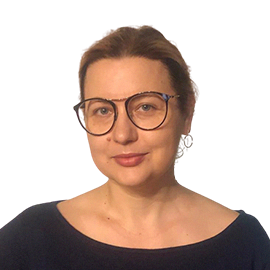Inviting foreigners to top positions in Ukraine would probably have not caused as much discontent, had the legionaries not been seen as timeservers after being granted citizenship of a country, for the good of which they intended to work.
With the appointment of Maria Gaidar, a Russian citizen, a deputy governor of the Odesa region, public discontent with the domination of foreigners in top offices has sharpened. It is not that Maria is associated with the aggressor state. And it is not that, in her first interview, she failed to give a definite answer to a question, which country is at war with Ukraine. And it is not about the fact that yet another representative of the Russian liberal segment, which is in opposition to Putin's regime, tends to avoid the Crimea issue. As we know, the Russians, even those in the opposition, despite publicly sympathizing Ukraine, still have some kind of a magic switch that prevents them from acknowledging the fundamental difference between Ukrainians and Russians. They still see both nations as one people no matter how hard you try to prove the opposite. And it seems that the Ukrainians have almost accepted this fact. Besides, part of the national liberal community is still waiting for Maria’s actions, not statements, to decide whether to criticize or praise her.
However, it is hard to put up with the attitude of some invited foreigners toward the Ukrainian citizenship, which the head of state provides quite easily. Especially considering that most foreigners in top Ukrainian offices prefer to have two or even three citizenships at a time. Meanwhile, even dual citizenship is prohibited in Ukraine.
Technically, the law is not being violated. Ukrainian legislation is so loyal to the incoming officials, that it allows a several years’ delay in quitting another citizenship (for example, Russian citizenship, as it is in Maria Gaidar’s case). The fact is that the cases of those foreigners, who have acquired the citizenship of Ukraine according to the president’s decrees as persons of public importance, do not fall under one of the paragraphs of Article 9 of the Law of Ukraine "On Citizenship", providing for an obligatory submission of a “declaration on the absence of foreign citizenship (for stateless persons)” or “an obligation to terminate foreign citizenship (for foreigners)" as prerequisites for being granted Ukrainian citizenship. Anyway, that is how the document is interpreted by said Ukrainian citizens holding high public offices.
Maria Gaidar also seems to be planning to act on this principle. She has already stated that she would not give up Russian citizenship, because "when you are granted citizenship, you have two years to make a choice". Although, the Ukrainian law does not give foreigners such a choice. It gives expats two years for submitting the necessary documents, taking into account possible delays in the termination of foreign citizenship, provided by the legislation of a country of origin of such “new Ukrainians”.
In other words, for the next two years, Maria plans to be working for the benefit of Ukraine, being a citizen of Russia (which violates the law on civil service, unequivocally stating that Ukrainian officials may only be citizens of Ukraine). And, by the way, if the reforms fail, one can always leave the office for good and wriggle out of the Ukrainian jurisdiction, leaving the solution of the problems to the country’s real, not temporary, citizens.
Tatiana Urbanskaya


